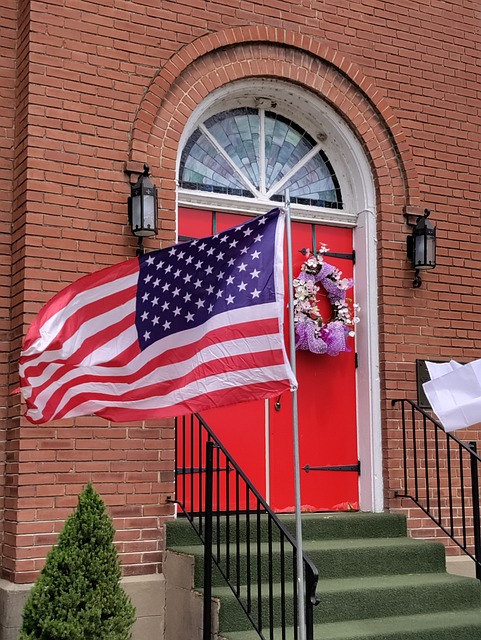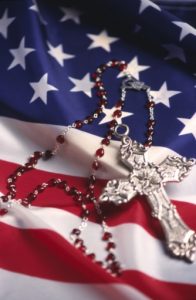 From attacks on churches and pregnancy centers to the threat of extreme laws aimed at forcing Christians to perform abortions and gender transition procedures on minors, the U.S. bishops have compiled a comprehensive report on the present state of religious liberty in the United States, the five greatest threats to our freedoms, and why the very lives of religious Americans may be at stake in 2024.
From attacks on churches and pregnancy centers to the threat of extreme laws aimed at forcing Christians to perform abortions and gender transition procedures on minors, the U.S. bishops have compiled a comprehensive report on the present state of religious liberty in the United States, the five greatest threats to our freedoms, and why the very lives of religious Americans may be at stake in 2024.The U.S. Conference of Catholic Bishops has issued the first edition of the Annual Report on the State of Religious Liberty in the United States which was compiled by the Committee for Religious Liberty under the leadership of Bishop Kevin C. Rhoades of Fort Wayne-South Bend. It details major developments in religious liberty in 2023 that occurred in the courts, Congress, federal agencies, and the culture, as well as what to expect in 2024.
“Alongside the great work that many other Catholic and religious liberty organizations are doing, I pray that this report helps raise awareness of the threats to our first freedom here in America, and that it helps Catholics and all people of good will contribute to the common good of these United States,” Bishop Rhoades said.
According to the USCCB press office, the report identifies a wide range of concerns, such as federal agencies misusing laws meant to aid pregnant women in order to promote abortion, threats to the safety of our Jewish and Muslim neighbors, and hostility toward ministries serving migrants and refugees.
As the report states, “Because control of the two chambers of Congress was divided in 2023, most introduced bills that threatened religious liberty languished. Rather, the vast majority of threats to religious liberty at the federal level last year came in the form of proposed regulations by federal agencies. These heavily focused on imposing requirements regarding abortion, ‘sexual orientation,’ and ‘gender identity’.”
The good news is that the Supreme Court of the United States heard two cases implicating religious liberty in 2023, and in each case ruled for broader protections — for religious exercise in the workplace (Groff v. DeJoy) and for free speech based on religious beliefs (303 Creative LLC v. Elenis).
However, “The issues of abortion and gender identity were at the heart of key cultural trends affecting religious liberty,” in 2023, the report continues, and “opposition to Christians’ witness against abortion continued to motivate vandalism against churches and pro-life pregnancy centers.”
The celebration of Pride Month in the US caused numerous controversies, including protests and counterprotests of the Los Angeles. Dodgers’ decision to honor the virulently anti-Catholic group Sisters of Perpetual Indulgence.
 Another area of concern in 2023 was the number of religious charities serving newcomers to our country who “found themselves the targets of intense anger, largely motivated by misinformation and partisan rhetoric related to the U.S.–Mexico border,” the report continued.
Another area of concern in 2023 was the number of religious charities serving newcomers to our country who “found themselves the targets of intense anger, largely motivated by misinformation and partisan rhetoric related to the U.S.–Mexico border,” the report continued.
“Dramatic, conspiratorial claims about religious charities’ ministry to newcomers led to calls for the government to penalize them, primarily through proposed restrictions on their access to programs and funding opportunities, and eventually to a call for violence against the charities’ employees," the report explained.
The terrorist attacks against Israel and the outbreak of war caused shocking antisemitic incidents in the United States to skyrocket with displays of open hatred that was tolerated by elected officials as well as presidents of major Ivy League universities.
As the report predicts, these trends are likely to continue in 2024 and only intensify due to the presidential election. It identifies the top five threats to religious liberty in 2024 as:
1. Attacks against houses of worship, especially in relation to the Israel-Hamas conflict
The Committee on Religious Liberty regards attacks on houses of worship as the largest threat to religious liberty in 2024. If this hostility was limited to continuing what were largely property crimes in 2023, the Committee would not have placed this at the top of their list of concerns. However, Israel–Hamas conflict have elevated the chances of a terrorist attack on a synagogue or mosque.
“Meanwhile, the highly charged atmosphere around the 2024 election might lead far-left extremists to escalate the severity of attacks on Catholic churches, and far-right extremists may view Catholic churches and Catholic Charities facilities as targets for anti-immigrant sentiment or, worse, violent action,” the report states.
Recommended action: Recognize and report signs of potential attacks, and encourage your pastor to utilize the “Protecting Houses of Worship” resources published by the U.S. Department of Homeland Security.
2. The Section 1557 regulation from the U.S. Department of Health and Human Services, which will likely impose a mandate on doctors to perform gender transition procedures and possibly abortions.
“No foreseeable legal development in 2024 poses a greater threat to religious liberty than HHS’s Section1557 regulation,” the report states. “Despite lip service paid to concerns of religious liberty, it appears to be specifically intended to force Catholic hospitals and religious health care workers to perform harmful gender transition procedures, including on children. Among the various federal regulations advancing gender ideology, its harms are the most severe. The final regulation may also include a mandate to perform abortions.”
 An attempt to impose a gender transition mandate failed in the 2016 version of the 1557 regulation due to religious liberty issues, and any new attempt will likely be successfully challenged immediately in court. However, “the regulation as proposed would undoubtedly exert a major chilling effect on the exercise of faith and conscience in health care, and would mark a regrettable entrenchment against the clear protections of the Constitution and the Religious Freedom Restoration Act.”
An attempt to impose a gender transition mandate failed in the 2016 version of the 1557 regulation due to religious liberty issues, and any new attempt will likely be successfully challenged immediately in court. However, “the regulation as proposed would undoubtedly exert a major chilling effect on the exercise of faith and conscience in health care, and would mark a regrettable entrenchment against the clear protections of the Constitution and the Religious Freedom Restoration Act.”
Recommended Action: Federal law provides a mechanism known as a disapproval resolution that Congress can use to invalidate a federal regulation. Congressional Republicans will almost certainly introduce such a resolution in response to the Section 1557 regulation. To receive notifications about how to support it, sign up at the USCCB Action Center for alerts.
3. Threats to religious charities serving new comers, which are likely to increase as the issue of immigration gains prominence in the election
“Welcoming the stranger, feeding the hungry, sheltering the homeless — these fundamental calls to Christian service are at the heart of Catholic service to new comers, which is itself a core ministry of the Church. Denying public aid to a religious charity because it heeds this Gospel call is a paradigmatic example of an unconstitutional condition on government funds,” the report states.
The Secure the Border Act (SBA, which is backed by the GOP, includes problematic provisions such as vague language that prevents Department of Homeland Security (DHS) funding to any nongovernmental organization that is deemed to be facilitating unlawful entry, or providing services such as transportation, lodging and legal services to undocumented migrants. This could be applied to Catholic organizations. The bill is unlikely to pass the Senate, but attempts may be made to include some of these problematic provisions into must-pass appropriations bills.
Recommendation for Action: The report urges Catholics to write to their representatives in Congress to let them know you support immigration reform for the common good of all, but not violations of the religious freedom of charities striving to serve newcomers in need.
4. Suppression of religious speech on marriage and sexual difference
“In numerous settings — schools, the workplace, health care — individuals are being pressured to conform to the orthodoxy of gender ideology. In 2024, this pressure may have the force of law via various federal agency actions, including the Title IX regulation and the EEOC’s enforcement of its guidance on workplace harassment,” the report warns.
Recommendation for Action: The bishops are urging the faithful to educate themselves on Church teaching about marriage so that they can communicate these beliefs with clarity and compassion. They suggest reading Marriage: Unique for a Reason, which is a valuable resource for understanding Church teaching on marriage and how to talk about it. Also, the USCCB Committee on Doctrine’s “Doctrinal Note on the Moral Limits to Technological Manipulation of the Human Body” offers an excellent summary of Church teaching on the immutability of sex.
5. The EEOC’s Pregnant Workers Fairness Act regulations, which aims to require religious employers to be complicit in abortion in an unprecedented way
The bishops believe it is highly likely that the EEOC’s (Equal Employment Opportunity Commission) final rule on the Pregnant Workers Fairness Act (PFWA) will retain its requirement that employers give employees paid leave for the purposes of obtaining an abortion.
“A federal mandate that private entities be complicit in second-and third-trimester abortions is unprecedented. And while some other proposed regulations from other agencies technically leave the possibility for religious exemptions open, the EEOC’s stated interpretation of PWFA’s religious exemption effectively forecloses any protection under the regulations.”
Recommended Action: Concerned Catholics should sign up for action alerts from the USCCB and join the committee’s efforts to encourage congressional action responding to the EEOC’s PWFA regulations.
“I pray that this annual report will serve, alongside the great work that many other Catholic and religious liberty organizations are doing, as a contribution to the common good of these United States,” Bishop Rhoades concludes. “We are Catholics. We are Americans. We are proud to be both.”
© All Rights Reserved, Living His Life Abundantly®/Women of Grace® http://www.womenofgrace.com
